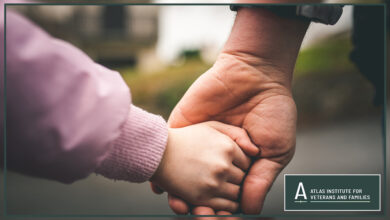Health and WellnessSponsored Stories
Happy holidays? Not for everyone
Robyn Rees, of Operational Stress Injury Social Support for the Canadian Armed Forces, explains why this can be the hardest time of the year for some military service members, veterans, and their families.
“My husband served in the forces for 16 years and was medically released due to Post-Traumatic Stress Disorder among other difficulties,” begins Robyn Rees, a Family Peer Support Coordinator with Operational Stress Injury Social Support (OSISS).
“And that journey is one that is not simple, and it is not the kind to go through by yourself either,” she continues. “That is where OSISS comes in.”
The OSISS program is a national peer support network for active military members, veterans, and family members who are experiencing an operational stress injury (OSI). Those with similar lived experience are able to provide mentorship, practical knowledge, and services that complement other mental health and family supports.
“Nobody wants to go to their best friend and say, ‘Hey, my husband punched a hole through the wall because he lost his temper yesterday.’ And these are things that do happen when mental health injuries are at their worst. We provide a safe environment for people to have those conversations and to be able to access those resources,” Rees explains.
“Whether they’re in treatment, whether they’re not in treatment, whether they’ve gone to an inpatient facility or not, we’re on the sidelines making sure they have the support that they need. And because we do have that lived experience, it makes it a little more safe or comfortable for members and their loved ones to come forward and have those intimate conversations.”
She offers non-clinical, judgement-free support and guidance for service members struggling with the psychological impact of their work. As Rees explains, “I liken peer support to a trusted friend who you’re not worried about judgement from.”
A MORE VULNERABLE POPULATION
According to Veterans Affairs Canada, 10% of war zone veterans will go on to experience PTSD. What makes service members more prone to mental health disorders?
“They are going to be exposed to things that nobody wants to think about in their wildest nightmares,” Rees says. “And unfortunately, the human brain just cannot reconcile those things. Because you’re talking about tragedy and loss and horrific experiences, they are more prevalent in the military.”
Another element to the story is moral injury, which Rees explains as “things that don’t sit well with our own moral codes.” Consider being given orders that go against your own personal beliefs and having to deal with the life-or-death consequences.
“When it’s a mental health injury and it’s affecting the entire state of their lives, both at work, at home, their sleep patterns—it is completely life-altering. And because they’re not visible, they’re just not looked at in the same way as a physical health problem.”
HO HO HUM
For many, the holidays are a time we look forward to all year, while for others, the additional time with family can provide more stress than relaxation. Robyn says that during the time between October and January, she sees more and more service members coming to her for support.
During this time, service members may feel more exposed and find it increasingly difficult to keep their mental health struggles private—they have nowhere to hide.
Rees says, “There’s a belief that [service members] are more on display around the holidays. It is really important to have those conversations about an ‘out’ in advance, so we can stop it before it hits a breaking point.”
What does she suggest service members and their families do to prevent reaching this crisis point? “When it comes to the holidays, we always encourage people—both on the family side and the veteran side—to have those difficult discussions. What are they going to be able to manage with regards to families coming together; where are those boundaries for them?”
FINDING TREATMENT AND HOPE
It is Rees’ goal that the work she does allows more service members to stay enlisted if they wish—and that means sometimes suggesting members seek further treatment for OSI or PTSD.
It’s the unique work experiences and trauma of this community—and growing requests from doctors and therapists—that motivated EHN Canada to develop programs specifically for them.
EHN Canada is a nationwide network of mental health and addiction treatment facilities with over 100 years of collective experience in helping those struggling with mental health, trauma, and substance use disorders. In particular, Edgewood Treatment Centre in Nanaimo, BC and the recently-opened Gateway Recovery Centre in Peterborough, ON offer exclusive therapeutic environments dedicated solely to treatment for military service members and veterans, as well as first responders and frontline healthcare workers.
EHN Canada leads the way in high quality, effective treatments, with programming led by experienced and compassionate mental health professionals. And by providing safe settings where individuals are free to speak to others who share common ground, evidence shows they’re able to achieve more success in recovery.
Colette Currin, EHN Canada’s National Director of Military, Veterans and First Responders, explains why facilities like Gateway and Edgewood are uniquely positioned to offer a chance at recovery:
“With decades of experience treating these conditions, we provide professional support designed specifically to target the harm and recover the individual. From admission to discharge, in-between and beyond, our passionate and highly skilled staff are trained to really understand their unique challenges.”
SIGNS OF SUCCESS
What does success look for Rees? Seeing those in recovery who in turn come back to help others.
“In the time that I have been doing this, I have seen more people return to an active-duty state after recovery than even a couple a couple of years ago. It used to mean that something like PTSD or an addiction would mean the end of a military career and it doesn’t necessarily mean that anymore. People come in their terrible moments, and later, we end up having them as volunteers or peer support co-ordinators,” she ends on an optimistic note.
LOOKING FOR IMMEDIATE SUPPORT?
To learn more about the Operational Stress Injury Support Service (OSISS), visit their website here.
Want to find out more about EHN Canada’s unique treatment programs and facilities designed for military service members, veterans, and their families? Visit here.


















